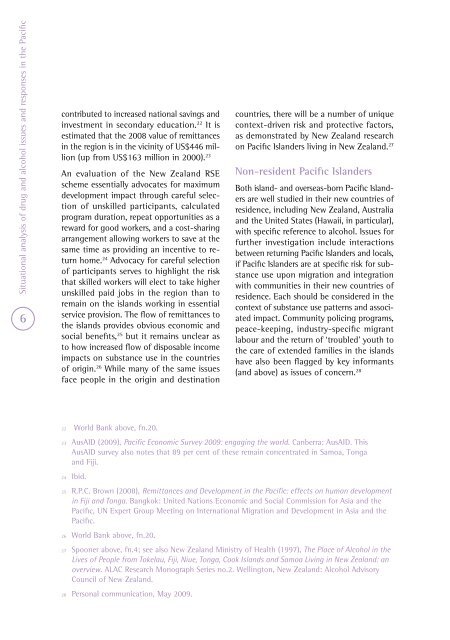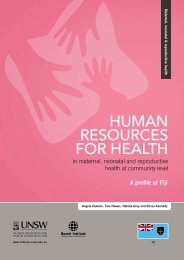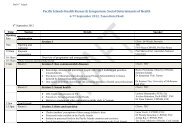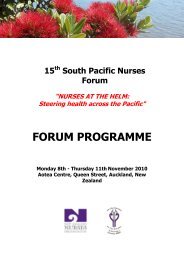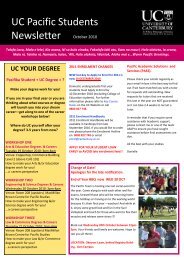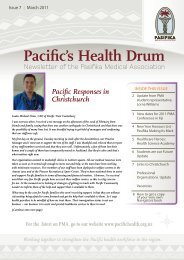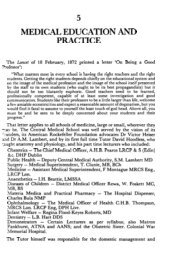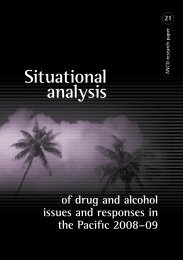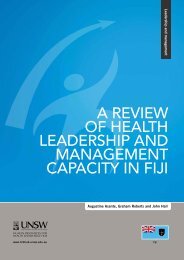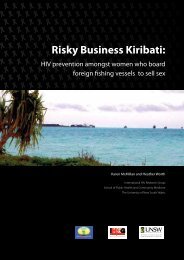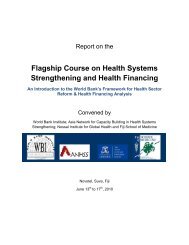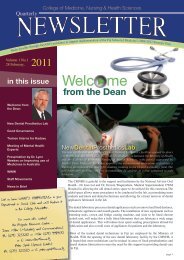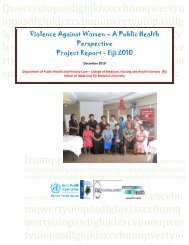rp21 situational analysis - Pacific Health Voices
rp21 situational analysis - Pacific Health Voices
rp21 situational analysis - Pacific Health Voices
Create successful ePaper yourself
Turn your PDF publications into a flip-book with our unique Google optimized e-Paper software.
Situational <strong>analysis</strong> of drug and alcohol issues and responses in the <strong>Pacific</strong><br />
6<br />
contributed to increased national savings and<br />
investment in secondary education. 22 It is<br />
estimated that the 2008 value of remittances<br />
in the region is in the vicinity of US$446 million<br />
(up from US$163 million in 2000). 23<br />
An evaluation of the New Zealand RSE<br />
scheme essentially advocates for maximum<br />
development impact through careful selection<br />
of unskilled participants, calculated<br />
program duration, repeat opportunities as a<br />
reward for good workers, and a cost- sharing<br />
arrangement allowing workers to save at the<br />
same time as providing an incentive to return<br />
home. 24 Advocacy for careful selection<br />
of participants serves to highlight the risk<br />
that skilled workers will elect to take higher<br />
unskilled paid jobs in the region than to<br />
remain on the islands working in essential<br />
service provision. The flow of remittances to<br />
the islands provides obvious economic and<br />
social benefits, 25 but it remains unclear as<br />
to how increased flow of disposable income<br />
impacts on substance use in the countries<br />
of origin. 26 While many of the same issues<br />
face people in the origin and destination<br />
countries, there will be a number of unique<br />
context-driven risk and protective factors,<br />
as demonstrated by New Zealand research<br />
on <strong>Pacific</strong> Islanders living in New Zealand. 27<br />
Non-resident <strong>Pacific</strong> Islanders<br />
Both island- and overseas-born <strong>Pacific</strong> Islanders<br />
are well studied in their new countries of<br />
residence, including New Zealand, Australia<br />
and the United States (Hawaii, in particular),<br />
with specific reference to alcohol. Issues for<br />
further investigation include interactions<br />
between returning <strong>Pacific</strong> Islanders and locals,<br />
if <strong>Pacific</strong> Islanders are at specific risk for substance<br />
use upon migration and integration<br />
with communities in their new countries of<br />
residence. Each should be considered in the<br />
context of substance use patterns and associated<br />
impact. Community policing programs,<br />
peace-keeping, industry-specific migrant<br />
labour and the return of ‘troubled’ youth to<br />
the care of extended families in the islands<br />
have also been flagged by key informants<br />
(and above) as issues of concern. 28<br />
22 World Bank above, fn.20.<br />
23 AusAID (2009), <strong>Pacific</strong> Economic Survey 2009: engaging the world. Canberra: AusAID. This<br />
AusAID survey also notes that 89 per cent of these remain concentrated in Samoa, Tonga<br />
and Fiji.<br />
24 Ibid.<br />
25 R.P.C. Brown (2008), Remittances and Development in the <strong>Pacific</strong>: effects on human development<br />
in Fiji and Tonga. Bangkok: United Nations Economic and Social Commission for Asia and the<br />
<strong>Pacific</strong>, UN Expert Group Meeting on International Migration and Development in Asia and the<br />
<strong>Pacific</strong>.<br />
26 World Bank above, fn.20.<br />
27 Spooner above, fn.4; see also New Zealand Ministry of <strong>Health</strong> (1997), The Place of Alcohol in the<br />
Lives of People from Tokelau, Fiji, Niue, Tonga, Cook Islands and Samoa Living in New Zealand: an<br />
overview. ALAC Research Monograph Series no.2. Wellington, New Zealand: Alcohol Advisory<br />
Council of New Zealand.<br />
28 Personal communication, May 2009.


